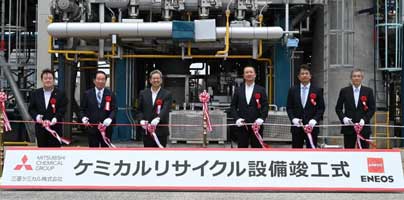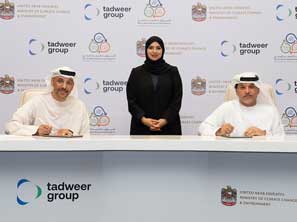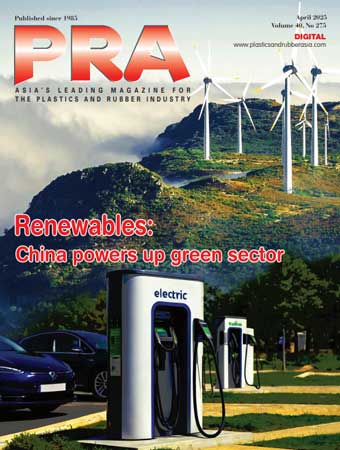Recycling: Eneos/Mitsubishi open Japan’s largest chemical recycling plant; UAE/Tadweer unveil pilot project for managing packaging waste

Japan’s Eneos and Mitsubishi Chemical (MCC) have completed construction of a chemical recycling facility towards the launch of the plastic-to-oil conversion business, which had been under construction at MCC's Ibaraki Plant (Kamisu City, Ibaraki Prefecture) since July 2021. The facility will have a processing capacity of 20,000 tonnes/year, which will be the largest-scale in Japan as commercial basis.
This facility employs hydrothermal plastic recycling technology (Hydro-PRT)2 that features supercritical water to chemically break down waste plastic procured externally and convert it into oil. The technology has been made available under a license agreement with UK-based Mura Technology Ltd. The recycled oil produced with the technology is used as feedstock at both companies’ existing refinery and naphtha cracker and reprocessed into petroleum products and various chemicals and plastics, thereby helping to realise a circular economy.
In addition, this facility plans to obtain ISCC Plus certification, an international certification systems for sustainable products. Once the facility is certified, the two companies will be able to offer various products made from the recycled oil.
Eneos says it aims to achieve both a stable supply of energy and materials and the realisation of a carbon-neutral society, while MCC aims to be a green specialty company.
In 2019, Eneos and MCC established the Kashima Complex LLP (LLP), and are studying the further collaborations in the refining and the petrochemical business in the Kashima district, Ibaraki Prefecture.
In other news, the United Arab Emirates (UAE) has launched what it says is the region’s first Extended Producer Responsibility (EPR) pilot, placing the onus of post-consumer waste on manufacturers and brand owners.

Spearheaded by the Ministry of Climate Change and Environment (MOCCAE), in partnership with Tadweer Group, the six-month pilot project aims to address the environmental impact of packaging, electronics, and batteries across Abu Dhabi and Dubai. Central to the initiative is a commitment to curbing packaging waste by embedding circularity into business operations and consumer engagement.
Tadweer Group will serve as the Producer Responsibility Organisation (PRO) and will oversee the pilot’s rollout, working closely with 26 corporate signatories of the EPR Pledge. These companies, from retail giants and packaging manufacturers to recyclers and electronics firms, have committed to advancing responsible packaging practices, raising consumer awareness, and sharing vital data to benchmark progress.
“Packaging waste is no longer a downstream issue; it’s a design and responsibility challenge,” said Amna binti Abdullah Al Dahak, Minister of Climate Change and Environment. “Through EPR, we are pioneering a system that redefines packaging as a resource to be reused, not just discarded.”
“This is a watershed moment in how we manage packaging in the UAE,” stated Eng. Ali Al Dhaheri, CEO of Tadweer Group. “EPR ensures producers aren’t just part of the problem, they are core to the solution.
While the project also includes electrical and battery waste, packaging takes centre stage. From fast-moving consumer goods to electronic product boxes, packaging waste makes up a significant share of municipal solid waste in the UAE. The pilot will introduce innovative waste segregation, collection, and recycling systems, with data-driven insights shaping future national policy.
Participating companies will allocate infrastructure for waste sorting and ensure all collected materials are processed in compliance with environmental standards. Additionally, they are responsible for consumer incentives, logistics planning, and transparent reporting mechanisms.
The MoU between MOCCAE and Tadweer also outlines strategic goals including improved regulatory readiness, community education, and the development of scalable frameworks to transition from pilot to national implementation.
While the pilot also includes electrical and battery waste, packaging takes center stage. From fast-moving consumer goods to electronic product boxes, packaging waste makes up a significant share of municipal solid waste in the UAE. The pilot will introduce innovative waste segregation, collection, and recycling systems, with data-driven insights shaping future national policy.
Signatories to the EPR Pledge include: Bee’ah Group, Ecyclex, Emaar, Imdaad, Madenat Recycling, Samsung, CANPACK, Tetra Pak, Huhtamaki, Lulu, Dulsco, Sparklo, Dubai Holding, Dubatt, WAT, Nadeera, Tomra, Recyclium, German Distribution, CPA, EROS, SIG, Enviroserve, ECC, Carrefour, and Veolia.
(PRA)SUBSCRIBE to Get the Latest Updates from PRA Click Here»









